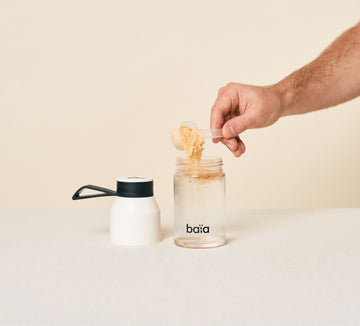5 false myths about anxiety
by Baia Food on Apr 19, 2024
Tabla de contenidos
Anxiety is a natural and normal response of the body to situations of stress, danger or uncertainty. However, when anxiety becomes excessive , persistent, and disproportionate to the situation, it can interfere with daily life.
* It is important to treat chronic anxiety with a specialist who can follow up. This blog attempts to help improve decisions, but it is not a solution to the problem. *
Myth 1: Anxiety is bad
This is a very widespread myth. Anxiety, like other emotions, is a natural response of the body. It is neither good nor bad, it has an evolutionary function . Anxiety is a mechanism that makes our body alert to a possible threat. For example, if you encountered an unknown tribe, it activated your physiological mechanisms to give you an advantage when fleeing or confronting the enemy.

The thing is that the world today is nothing like the world in which we evolved. Today, we perceive situations in which our lives are not in danger as threats.
For example, arriving late to work can put us on alert. This is normal, as long as it doesn't cause excessive worry leading to thoughts like "I'm going to get fired and I'm not going to find another job." Our body's reaction is disproportionate to what is really happening. It's not nice to confront your boss if you're late, but it's not a life or death situation. However, you have activated all the physiological mechanisms as if it were. Which brings us to myth number 2.
Myth 2: We cannot modify its intensity or expression
Even though it is activated involuntarily, we can apply certain tools and strategies that help us manage its intensity or when it appears.
The first thing is to accept that it is there , thank it for "coming" to warn us of the possible danger and not classify it as "bad."

The second thing is to change our thinking pattern . Yes, thoughts are very powerful and if we constantly think things like "I won't have time today" or "I never do it well", you will activate those mechanisms.
We cannot control every thought, but we can try to redirect them when we realize it, thinking "I am doing the best I know, this is an opportunity to learn."
Finally, it is proven that "forcing" a change in our body posture affects how we feel. If you feel distrustful or worried excessively, adopt expansion postures, with your arms and shoulders open, and smile. Your body associates these postures with positive moments of relaxation and confidence.

Myth 3: Bad habits, tobacco and alcohol do not influence anxiety
Nowadays we all know the harmful effects of alcohol and tobacco , but we often resort to them when we find ourselves in a loop of stress and negative thoughts.
Although it is true that in the short term they give us a feeling of pleasure or sedation, when their effects wear off, the discomfort returns and probably in a stronger form , generating more anxiety in the long term. In fact, quitting smoking relieves stress and reduces symptoms of depression (1). In addition, they also damage our body.

The first step is to become aware that these substances only give us immediate pleasure and look for a strategy that has a real impact on our well-being. Breathe, be aware of what you feel, accept it, try to understand what that fear, that worry, is telling you. Try to generate positive thoughts or thoughts that relativize your anxiety.
Myth 4: Anxiety is only a mental problem
Did you know that a poor diet, lack of sleep or lack of movement can contribute to your anxiety? We are a whole: how your body is affects your mind and how your mind is affects your body.
It may be that certain habits are negatively contributing to your anxiety, and you're not even aware of it. It is not necessary to take drastic measures, but rather go little by little . The amount of information about health can lead us to worry excessively and end up doing nothing.
Therefore, focus on the 20% of actions that give you 80% of the results, on what is really important: reduce processed and toxic foods and progressively incorporate fresh and natural foods.
Make sure you spend enough time sleeping so your body can rest and repair itself. Move, in the way you like best. You can go for a walk with a podcast, play sports with friends, jump rope, ride a bike... (2).
In fact, any small healthy habit you incorporate will have a very positive effect!

Myth 5: Natural supplementation does not help with anxiety
If anxiety is part of your daily life, the first thing is to incorporate habits that help you manage it (as we have been discussing throughout the blog) and use certain tools. Supplementation is one of those tools that can give you that last push.
There are natural supplements , such as ashwagandha and other adaptogens, that can help manage symptoms of anxiety and stress.

Adaptogens are a group of plants, herbs and fungi that grow in hostile environments, enduring great adversity. Thanks to this, they develop chemical compounds, which can be of great help when we consume them. They improve tolerance to any type of stressor (physical, chemical or biological) and promote a state of balance (if the body is very activated, it calms it and if it is very calm, it stimulates it).
The word "adaptogen" refers to its ability to help the body adapt. Plus, they are safe for the body. It does not produce negative or harmful effects and has no side effects.
In short, each person is a world. There are situations like taking a plane that can generate anxiety for many people while not for others. That is why it is important not to compare yourself and understand that each body perceives different threats. Professional help is always a great help to understand this great emotion and teach us tools to manage it.
1. https://www.guadalsalus.com/blog/relacion-entre-alcohol-y-ansiedad
2. https://www.mayoclinic.org/es/healthy-lifestyle/stress-management/in-depth/exercise-and-stress/art-20044469#:~:text=The%20ejercicio%20regular%20may%20increase ,%20depression%C3%B3n%20and%20%20anxiety









